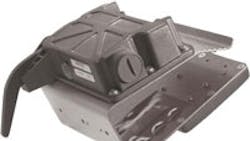Lack of Standards Is Slowing Adoption of RFID for Cargo Security
It's been several years now since consumer goods manufacturers received their marching orders from retail giant Wal-Mart Stores Inc. and the U.S. Department of Defense to start implementing radio frequency identification (RFID) technology into their operations. There, the goal has primarily been to speed up warehousing operations and improve inventory management.
And yet, paradoxically, the U.S. government has been much slower to issue any kind of mandate regarding the implementation of RFID on cargo containers, where the goal would be much loftier: ensuring supply chain security and thwarting terrorists and hijackers.
One reason for the lag in cargo security technology adoption has been market confusion about standards. An ISO committee has issued a standard based on active RFID tags, i.e., those that include a power source, such as a battery. However, according to a recent study conducted by ABI Research, many end-users would rather use passive RFID solutions (no power source, and much less expensive), which are the types of tags Wal-Mart and DoD suppliers are adopting.
However, he continues, since the Department of Homeland Security has not issued any kind of RFID mandate, end-users have mostly taken a "wait and see" position. In the meantime, some suppliers of passive RFID tags are working with other standards groups to create a passive RFID standard for container tracking, according to ABI Research.
"So far, the U.S. government has wielded the 'carrot' of expedited processing of sealed containers, rather than the 'stick' of a legal mandate," observes Mike Ippoliti, another research director at ABI Research. "That carrot has not been tasty enough to tempt any of the interested parties. While nobody wants a container-related breach of security, only if there is a major incident will the government try to impose its will on this industry. If and when that happens, we expect the container security market to explode."
See Also
About the Author
Dave Blanchard
Senior Director of Content
Focus: Supply Chain
Call: (941) 208-4370
Follow on Twitter @SupplyChainDave
During his career Dave Blanchard has led the editorial management of many of Endeavor Business Media's best-known brands, including IndustryWeek, EHS Today, Material Handling & Logistics, Logistics Today, Supply Chain Technology News, and Business Finance. He also serves as senior content director of the annual Safety Leadership Conference. With over 30 years of B2B media experience, Dave literally wrote the book on supply chain management, Supply Chain Management Best Practices (John Wiley & Sons, 2010), which has been translated into several languages and is currently in its second edition. He is a frequent speaker and moderator at major trade shows and conferences, and has won numerous awards for writing and editing. He is a voting member of the jury of the Logistics Hall of Fame, and is a graduate of Northern Illinois University.
